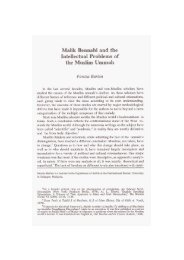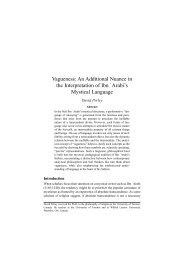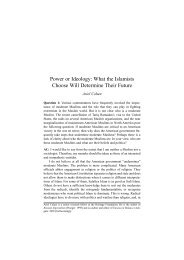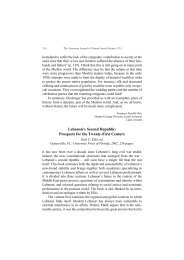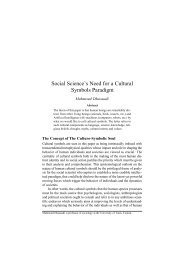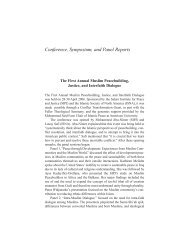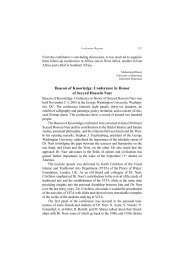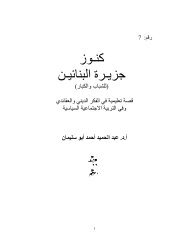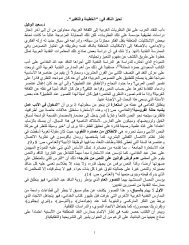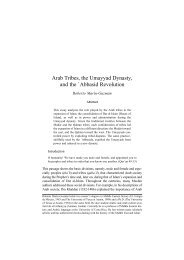The Book of Revenue - Epistemology
The Book of Revenue - Epistemology
The Book of Revenue - Epistemology
You also want an ePaper? Increase the reach of your titles
YUMPU automatically turns print PDFs into web optimized ePapers that Google loves.
130 <strong>The</strong> American Journal <strong>of</strong> Islamic Social Sciences 21:1<br />
Sidq, fawq, akhlaq, tafarruq, iftiraq, sharq, and dhawq appear continuously<br />
as sidl, fawl, akhlal, tafarrul, iftiral, sharl, dhawl, and so on. But<br />
this is not a major blemish, because the facing English makes it easy to<br />
pick out the errors.<br />
Atif Khalil<br />
Ph.D. Candidate and Instructor<br />
Centre for the Study <strong>of</strong> Religion<br />
University <strong>of</strong> Toronto, Toronto, Canada<br />
<strong>The</strong> <strong>Book</strong> <strong>of</strong> <strong>Revenue</strong><br />
Abu `Ubayd al-Qasim ibn Sallam, trans. Imran A. K. Nyazee<br />
Reading, UK: Garnet Pub. Ltd. and Doha, Qatar: <strong>The</strong> Center for<br />
Muslim Contribution to Civilization, 2003. 608 pages.<br />
With the revival <strong>of</strong> Islamic finance, the translation <strong>of</strong> this seminal work<br />
on fiscal matters is a significant landmark. While such Islamic thinkers as<br />
Baqir al-Sadr, Abu’l A`la al-Mawdudi, and others were formulating the<br />
thinking that eventually engendered Islamic banks and finance houses,<br />
most <strong>of</strong> the classical reference works in Arabic remained obscure and<br />
unpublished. Over the past 50 years, however, much has changed.<br />
Of course, the Qur’an and Sunnah provide a wealth <strong>of</strong> material on<br />
transactions (mu`amalat). However, during the first few centuries, Muslim<br />
jurists expended great energy on the subject, especially as Muslims<br />
encountered business practices and legal customs that differed from those<br />
found in seventh-century Arabia. That this body <strong>of</strong> law was ignored for<br />
several centuries, however, is part <strong>of</strong> the legacy <strong>of</strong> colonialism and, in part,<br />
a very natural phenomenon. After the colonial and other powers marginalized<br />
Islam’s social and cultural institutions, it is not surprising that fiqh<br />
was relegated to academic settings. Moreover, in order for it to become<br />
vibrant once again, it required practitioners who were conversant with the<br />
classical discipline as well as cognizant and appreciative <strong>of</strong> the world’s<br />
new realities.<br />
Beginning with the theoretical musings <strong>of</strong> such thinkers as Baqir al-<br />
Sadr, Mawdudi, and Qutb, the growth <strong>of</strong> Islamic banks and investment<br />
houses in the decades <strong>of</strong> the seventies and eighties provided the incentive<br />
for more practical studies; and a new generation <strong>of</strong> Muslim jurists began<br />
work in earnest on modern finance. What began as a handful <strong>of</strong> small<br />
banks in the Gulf in the 1970s, developed in the 1980s into over 100 such
<strong>Book</strong> Reviews 131<br />
institutions with tens <strong>of</strong> thousands <strong>of</strong> employees and, in the 1990s, into a<br />
worldwide industry. Today Islamic finance is recognized by financial<br />
experts worldwide as an emerging story <strong>of</strong> success; and its success has<br />
revived serious interest, on the part <strong>of</strong> scholars and practitioners, in the<br />
subject <strong>of</strong> fiqh al-mu`amalat.<br />
<strong>The</strong> translator has shown a keen appreciation for these developments.<br />
<strong>The</strong> body <strong>of</strong> his work includes an important analysis <strong>of</strong> modern finance<br />
from an Islamic legal perspective in the form <strong>of</strong> his two-volume monograph<br />
entitled <strong>The</strong> Islamic Law <strong>of</strong> Business Organization. In translating <strong>The</strong><br />
<strong>Book</strong> <strong>of</strong> <strong>Revenue</strong>, Nyazee has made a classic accessible to the English-reading<br />
public and has contributed to the growing Islamic financial industry.<br />
However, the Center failed to employ a capable editor, one who<br />
could produce an accurate and error-free text, a helpful set <strong>of</strong> footnotes,<br />
and a bibliography. Moreover, the Center should have invited the translator<br />
to contribute an introduction or preface to explain his approach.<br />
Editorial review appears to have been cursory at best. Such issues as the<br />
inconsistent use <strong>of</strong> diacriticals detract from the final work’s quality, and<br />
abundant typos call the standard <strong>of</strong> the work itself into question. <strong>The</strong>se<br />
are particularly in evidence in the introduction, written by Dr. Ibrahim<br />
Oweiss.<br />
Before leaving Oweiss’ introduction, I would like to point out another<br />
problem area, one <strong>of</strong> particular sensitivity in the present climate <strong>of</strong> extremists,<br />
fundamentalists, and the literalism that begets them. In summarizing<br />
the topics discussed in each chapter, Oweiss performs a welcome service.<br />
However, his summary <strong>of</strong> chapter 14, is incomplete and seems to suggest<br />
what I am sure he does not mean. After seeming to equate a tax collector<br />
(makis) with a collector <strong>of</strong> `ushr (p. xxvi), he concludes that the chapter<br />
states: “Hence, whoever meets an `ashir (one who charges tax) should kill<br />
him.” A quick look at chapter 14, however, explains that “he meant by this<br />
the person who charges sadaqa without having a right to do so” (p. 484).<br />
In concluding this discussion, the author says: “<strong>The</strong> meaning <strong>of</strong> all these<br />
traditions that we have mentioned about the `ashir and the disapproval and<br />
condemnation <strong>of</strong> the makis is to be traced to its source in the Jahiliyya”<br />
(pp. 485-86).<br />
Let me point to a few other shortcomings. In the “Introduction: <strong>The</strong><br />
Ruler and the Wealth <strong>of</strong> Subjects,” footnote 2 (p. 3) explains that the narrator<br />
was called al-Badi’ or (in the text itself) al-Badi’ was that “he was born<br />
after his (twin) brother.” <strong>The</strong> footnote then explains that “This is stated by<br />
al-Sam`ani in his al-Ansab.” However, upon consulting this work, the fol-
132 <strong>The</strong> American Journal <strong>of</strong> Islamic Social Sciences 21:1<br />
lowing was discovered: “<strong>The</strong> one best known for this name was Abu’l-<br />
Hasan Ahmad ibn `Ali al-Badi’. Our Shaykh, Abu’l-Fadl Muhammad ibn<br />
Nasr al-Hafiz, in al-Haqah (a commentary) on the book <strong>of</strong> Ibn Makula<br />
(stated): Ahmad ibn `Ali al-Badi’ related (hadiths) from Da`laj ibn Ahmad<br />
al-Sijzi and others. <strong>The</strong> last person to relate hadiths from him was Abu’l-<br />
Fawaris Tarrad al-Zaynabi. He (Abu’l-Hasan Ahmad ibn `Ali) was commonly<br />
known as Ibn al-Bada, and I was told by a certain Shaykh that he<br />
was (known as) al-Badi’. <strong>The</strong> Shaykh said, “I asked him about that and he<br />
replied: ‘I was born, my brother and myself, as twins. And I was the one to<br />
emerge first. So I became known as al-Badi’ (<strong>The</strong> Initial One).’” This<br />
inconsistency is troubling, for the Arabic footnote includes most <strong>of</strong> the<br />
above. A careful editor might easily have detected and corrected this.<br />
On page 4, footnote 7 says: “Ibn Lahi`a is considered a weak (da`if )<br />
narrator <strong>of</strong> traditions.” While many scholars have considered Ibn Lahi`a<br />
unreliable, this does not mean that he was wholly unreliable. In fact, al-<br />
Mansur appointed him chief justice <strong>of</strong> Egypt, Ibn Hanbal said <strong>of</strong> him: “In all<br />
<strong>of</strong> Egypt there is no one the equal <strong>of</strong> Ibn Lahi`a in terms <strong>of</strong> the numbers <strong>of</strong><br />
hadiths he related, or in terms <strong>of</strong> his command (memory) <strong>of</strong> hadiths, or his<br />
accuracy.” In fact, Ibn Lahi`a recorded the hadiths he heard from his<br />
shuyukh in registers and then transmit them onward. However, after his registers<br />
were lost in a fire, he began making errors, and so scholars became<br />
wary <strong>of</strong> his later narrations. Such an apparently minor point is important,<br />
especially in a work that is essentially a collection <strong>of</strong> narrations, for critical<br />
equilibrium must be maintained. This is not necessarily a criticism <strong>of</strong> the<br />
translator, but simply another example <strong>of</strong> the need for quality editing.<br />
On page 386, a sentence reads: “<strong>The</strong> traditions are continuous on<br />
this.” Here, unless the reader is familiar with mutawatir, it is unlikely that<br />
this sentence will mean very much <strong>of</strong> anything … “continuous traditions?”<br />
Without going into the theology <strong>of</strong> this particular term (and<br />
loaded with theology it is!), this sentence could have been rendered as:<br />
“<strong>The</strong> evidence <strong>of</strong> the traditions on this point is overwhelming.”<br />
All in all, however, this translation is a valuable contribution to the<br />
library <strong>of</strong> Islamic classics in English. <strong>The</strong> translator and publisher are to<br />
be commended on their selection and production. Even the paper’s quality<br />
is excellent.<br />
Yusuf Talal DeLorenzo<br />
Shari`ah Advisor to Islamic Financial Institutions<br />
Ashburn, Virginia



